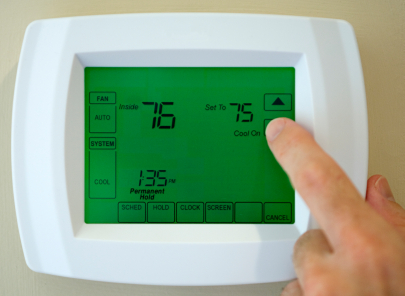10 Ways to Heat Your Home for Less
Heating your home is a significant expense for many families, and can be difficult to plan for with fluctuating prices of natural gas, propane, and oil. Regardless of where prices end up this winter, review the following 10 tips to learn how to conserve heat in your home and save money:
 Install a programmable thermostat that will allow you to control heating at night and while you are not home. Many people spend the majority of the day at work, and failing to turn the heat down during this time will waste energy and money. The Good Housekeeping Research Institute (GHRI) recommends the Honeywell RTH8500 ($150), the Ritetemp 6036 ($70) and the Honeywell RTH7500 ($100) as several of the most durable, appealing, and user friendly programmable thermostats.
Install a programmable thermostat that will allow you to control heating at night and while you are not home. Many people spend the majority of the day at work, and failing to turn the heat down during this time will waste energy and money. The Good Housekeeping Research Institute (GHRI) recommends the Honeywell RTH8500 ($150), the Ritetemp 6036 ($70) and the Honeywell RTH7500 ($100) as several of the most durable, appealing, and user friendly programmable thermostats.- Keep your thermostat under 70 degrees, as you can save approximately one percent on your annual heating bill for every degree you lower your thermostat over the course of eight hours.
- Clean your furnace, since a cleaned and serviced furnace will run more efficiently, saving you money over the long term. It’s best to schedule your appointment soon, before winter weather arrives and everyone else is trying to secure their appointments.
- Keep your blinds and drapes open during the day and closed at night. This will let sunlight into your home during the day, while reducing the chill or cold air from cold or drafty windows at night.
- Clean heating vents and radiators as needed, and ensure that they aren’t blocked by furniture, carpeting, drapes, or other personal property.
- Considering supplementing your heating system with one or more space heaters, especially if you spend the majority of your time in one room. Turning your heat down to 62 degrees and adding a space heater in your most frequently occupied room can save you approximately $200 per year, according to the GHRI. If you purchase a space heater, be sure to place the unit on a level surface at least three feet away from anything flammable or that could block air intake or head output, familiarize yourself with the warnings that come with the product, and keep children and pets away from the heater. The GHRI recommends the Honeywell HZ-385BP ($80) or HZ-7204U ($40), the Soleus Air HGW-308 ($80), and the Vornado VH2 ($70) as the best space heaters in terms of safety (including child and pet safety), ease of use, noise level, and energy consumption.
- Close rooms that don’t require much heat to conserve heat and direct it to the rooms used most often. Have a spare bedroom or storage room you rarely use? Shut the door and close the heating ducts in it since there is no need to fully heat a room that no one uses.
- If you have a fireplace that you aren’t using to heat your home, consider sealing it off for the winter. Using plastic sheeting to seal off your fireplace that isn’t being used will prevent heat from escaping up the chimney. Other spots to consider sealing off for winter include the cracks in your attic or basement door and the edges of drafty windows.
- Check the temperature on your water heater to ensure that it doesn’t exceed 120 degrees. This temperature is sufficient for heating most homes, as water doesn’t need to be boiling to get the job done. At the same time, it’s a smart idea to make sure that your water heater is encased in insulation.
- When it comes time to buy a new furnace, do your research and choose high-efficiency Energy Star products. It’s important to look for high Annual Fuel Utilization Efficiency (AFUE) ratings – the national minimum is 78 percent AFUE, but you can find Energy Star models that exceed 90 percent.
While all of these tips can help you better understand how to conserve heat and save money, we can also help you save money on another home-related expense – your homeowners insurance. Eaton & Berube works with the nation’s top insurance companies to offer you the best customized home insurance rates in NH. To request a free home insurance quote, please submit our Online Insurance Quote Request Form.
Did we forget any important ways to save? Tell us in the comments below how you conserve heat in your home to cut costs.
Other Topics of Interest:
